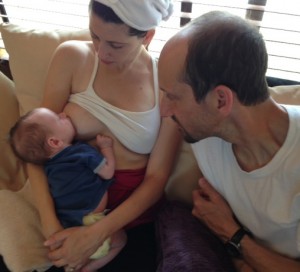 Breastfeeding is something that every mother and every baby has a right to do. More importantly, it is widely accepted as the preferred way to feed a baby. We can all rattle off numerous health risks to mom and baby that can result from artificial feeding. It follows, then, that our health care providers—especially those who are charged with the task (and privilege!) of supporting new mothers and vulnerable infants—would be well versed in how to support the breastfeeding dyad. Tragically, this is sometimes not the case. Continue reading
Breastfeeding is something that every mother and every baby has a right to do. More importantly, it is widely accepted as the preferred way to feed a baby. We can all rattle off numerous health risks to mom and baby that can result from artificial feeding. It follows, then, that our health care providers—especially those who are charged with the task (and privilege!) of supporting new mothers and vulnerable infants—would be well versed in how to support the breastfeeding dyad. Tragically, this is sometimes not the case. Continue reading
Nursing Your Older Baby or Toddler
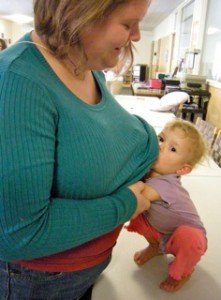 The word breastfeeding typically conjures up soft-focus images of mom/baby blissful, peaceful togetherness. The baby is still, looking up into mothers eyes, or perhaps drinking with eyes closed. Mother has a dreamy look on her face as she enjoys the warmth and glow of oxytocin. It is a beautiful, serene picture.
The word breastfeeding typically conjures up soft-focus images of mom/baby blissful, peaceful togetherness. The baby is still, looking up into mothers eyes, or perhaps drinking with eyes closed. Mother has a dreamy look on her face as she enjoys the warmth and glow of oxytocin. It is a beautiful, serene picture.
As you baby grows, things may change. You will still get those sweet, sleepy nursing times. But when awake, your older baby will want to move. She may even want to move while she is attached to the breast. She may put her foot in the air. Or on your shoulder! She may want to nurse standing up or upside down. She will want to see the source of the noise across the room. She wants to interact with big sister without letting go of your precious breast. And often, she doesn’t seem to realize that the breast is attached to YOU! We often call this “acrobatic nursing.”
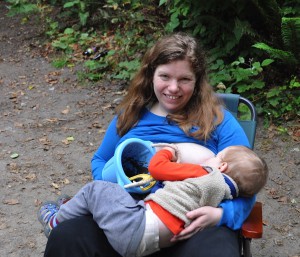 Some older nurslings will find it absolutely necessary to keep at least one hand busy throughout the nursing time. Your baby may want to play with your hair, your necklace or a toy. He may even want to hold the other breast. Even though all of these behaviors are perfectly normal and developmentally appropriate, I’m the first to admit they can be annoying.
Some older nurslings will find it absolutely necessary to keep at least one hand busy throughout the nursing time. Your baby may want to play with your hair, your necklace or a toy. He may even want to hold the other breast. Even though all of these behaviors are perfectly normal and developmentally appropriate, I’m the first to admit they can be annoying.
Breastfeeding is a relationship between 2 people. If there is something going on during breastfeeding that is painful or you simply don’t like it, it’s perfectly ok to say so! When your newborn baby didn’t latch correctly and it hurt, you broke the latch and tried again. If your toddler is amused by pinching your belly fat while she’s nursing and you don’t like it, you can let her know it’s not ok. It’s completely appropriate for you to set limits. It’s your body! If, on the other hand, you find your nurslings acrobatics amusing and cute, by all means, enjoy!
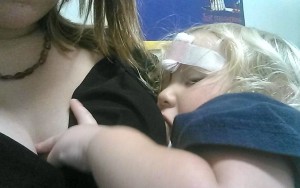 One of the truly wonderful and often overlooked benefits of nursing toddlers is the immediate pain relief it provides. Toddlers fall—a lot. They bang into things. They get frustrated by what they can’t do yet. A quick dose of your milk will often cure whatever has made your toddler dissolve into tears. Whether it’s rage or pain, nursing is nothing short of miraculous.
One of the truly wonderful and often overlooked benefits of nursing toddlers is the immediate pain relief it provides. Toddlers fall—a lot. They bang into things. They get frustrated by what they can’t do yet. A quick dose of your milk will often cure whatever has made your toddler dissolve into tears. Whether it’s rage or pain, nursing is nothing short of miraculous.
Enjoy your nursling. This time is short. Soon he’ll be running around having fun with his friends and will simply be too busy to cuddle with mommy. Oh, ok.. maybe just a little!

See also, “Breastfeeding and Biting: Tips to Avoid Those Teeth!” And “Weaning: What’s Normal?”
Low Milk Supply: Tricky to Treat!

Supplementing at the breast.
When a mom is experiencing difficulty making enough milk for her baby, the usual suggestion from well meaning professionals is often, “Nurse your baby more —your body will rally and you will make more milk in just a few days.” This suggestion is based on the law of supply and demand. When more milk is removed from the breast, the breast will respond by making more milk. While this advice can be legitimate in some situations, many times it can result in an exhausted baby who, despite mom’s best efforts, can’t get enough milk to gain well. Continue reading
I’ve Lost my Milk! Is it Possible to Relactate?
From first-time mom, Shelly:
In honor of World Breastfeeding Week, I’m making a toast: Here is to trying again. Here is to providing the best for my baby. Here is to hard times. Here is to when you thought it was all over and starting anew.

Shelly’s baby–latching again!
The back-story from Shelly:
I am in the process of getting some health issues under control which I know has contributed to declining milk production since about 5 months. So now, at 7 months, my daughter shows little interest in the breast. If I completely stop providing milk for her now, would it be possible to re-establish in a couple months once I can get my own body under control? I have PCOS and thyroid issues and it has taken a while to get into a doctor to re-test hormone levels and get it treated. I would love to keep giving her breast milk once I can produce again, but I really need to focus on me right now. I am exhausted every day to the point where I can barely take care of my daughter. Adding in pumping would be too much!
Renee’s response: I think what you’re saying is that pumping would be too difficult for you with your health issues? Yes it’s possible to re-lactate. but not easy.
It’s nice to know it is possible. I just didn’t want to get my hopes up if there was little to no chance at all.
Here’s an update from Shelley.. a month later:
After my milk supply decreased, I started my baby on solids and tried formula, but wasn’t happy with it. I switched to a EU (European) brand that I still use now. Over the past 2 1/2 months, not surprisingly, my supply dwindled to just about nothing. I had realized that getting to 6 months with breastfeeding was a huge thing to be proud of; something most women in my family never got to experience. After learning that it was possible to get my milk back, I decided to try last week. It was time to get back into it, no matter how hard it was. So I started pumping again. She needs my milk. If I never can 100% breastfeed again, that is fine. But I want her to want me when she is hungry, not the bottle. This morning I tried to breastfeed for the first time in many weeks. She latched on!! It only lasted a minute or two, but it was something. It was a start. There is now hope that I am not insane and this could actually work.Thank you for your support and encouragement!
Thank YOU, Shelly for sharing your story with us!
Note: If you are interested in resuming breastfeeding after cessation, please contact an IBCLC experienced in helping with relactation and inducing lactation. She can help you develop a plan that is right for you.
Take off and Let Downs–Pumping and Air Travel
Breastfeeding: Sweet. Intimate. Close connection between mother and baby. It’s a lovely soft-focused kind of image, right?
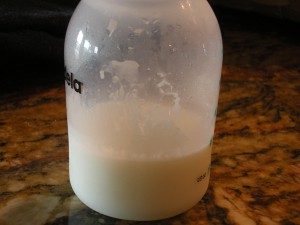 Unless you have to be separated from your baby for work or school. Then it’s all business. Maintaining milk production. Tallying the ounces in the freezer. Strategizing about how to get one more pumping session in every day. Stressing if you have low output at lunch or if someone schedules a meeting during the time you’re supposed to be pumping.
Unless you have to be separated from your baby for work or school. Then it’s all business. Maintaining milk production. Tallying the ounces in the freezer. Strategizing about how to get one more pumping session in every day. Stressing if you have low output at lunch or if someone schedules a meeting during the time you’re supposed to be pumping.
And what if you need to be away from your baby for more than one day? What if you need to travel for your job sans baby? What if you need to be on an airplane for more than a few hours? Is it possible to pump on a plane, maintain your milk production, save your milk AND bring it home for your baby? Continue reading
